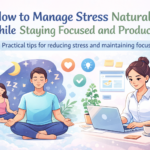In today’s fast-paced world, finding time to study effectively is more important than ever. Distractions are everywhere, making it difficult to focus and retain information. Whether you’re preparing for an important exam or trying to stay ahead in your courses, unlocking your brain’s potential for maximum focus is the key. Here’s a guide to quick, actionable focus tips that will help you study smarter, not harder.
1. Create the Perfect Study Environment
Your surroundings have a direct impact on how well you focus. A cluttered or noisy environment can sap your attention, making it difficult to concentrate. On the other hand, a well-organized, quiet space can do wonders for your productivity.
- Eliminate distractions: Turn off notifications on your phone or put it on “Do Not Disturb” mode. Close irrelevant browser tabs or apps.
- Use ambient noise or silence: Some people work better with background music or white noise, while others prefer silence.Try a few things to find out what fits you the best.
- Organize your workspace: Keep only the essentials—books, notes, and tools—on your desk.Keeping your desk tidy can support mental clarity and concentration.
2. Set Specific Goals for Each Study Session
Vague goals like “study math” or “read chapters” won’t get you far. Specific, actionable goals keep your mind focused on the task at hand.
- Break down larger tasks: Instead of saying, “Study for biology,” break it down into smaller goals like “Review Chapter 3 notes” or “Practice 10 quiz questions.”
- Time your tasks: Use the Pomodoro Technique (25 minutes of focused work, followed by a 5-minute break) to maintain focus without burnout.
By setting clear objectives, you’re creating a roadmap for your study session, making it easier to stay on track.
3. Try Brain-Boosting Foods
Fueling your body with the right nutrients can significantly improve your focus and cognitive function. Certain foods are known to enhance brain power and concentration.
- Eat a healthy breakfast: Skipping meals can affect concentration. A healthy meal rich in whole grains, fruits, and protein can provide the energy needed for sustained focus.
- Incorporate brain foods: Snack on foods like blueberries, dark chocolate, nuts, and fatty fish (like salmon) that are known to enhance cognitive function.
- Stay hydrated: Even mild dehydration can impair cognitive performance, so keep a bottle of water on hand to sip during your study sessions.
4. Master the Art of Time Management
One of the most important aspects of productive studying is how you manage your time. Students often procrastinate or cram, which leads to poor retention and high stress levels. Time management is the answer to studying effectively.
- Use a planner or app: Planning out your day or week ahead of time can help you avoid last-minute panic. Tools like Google Calendar, Notion, or specialized study apps can help you stay on track.
- Prioritize your tasks: Tackle the most challenging tasks during your peak focus times (e.g., mornings) and leave lighter tasks for when your energy levels drop.
- Balance study and breaks: Don’t forget to schedule short breaks. Overworking your brain can lead to burnout, while regular breaks can refresh your mind and help you focus better.
5. Use Active Learning Techniques
Passively reading or highlighting your notes isn’t the most effective way to study. Active learning techniques, on the other hand, keep your brain engaged and improve retention.
- Use flashcards: Quiz yourself on important terms and concepts. Apps like Anki and Quizlet make it easy to create and study flashcards on the go.
- Practice retrieval: Instead of rereading notes, test yourself by recalling key information without looking. This improves knowledge retention and fortifies your memory.
- Teach the material: Explaining a concept to someone else is one of the best ways to reinforce your understanding. If you don’t have a study buddy, try explaining concepts out loud to yourself.
6. Try Focus-Enhancing Supplements
For some students, focus supplements like caffeine and nootropics can provide an extra mental boost when used responsibly. Supplements should never replace a good night’s sleep or a healthy diet, but they can give you a short-term edge.
- Caffeine: Coffee or tea can enhance focus and energy in the short term. Just be cautious not to overdo it, as too much caffeine can lead to jitters or a crash later.
- L-Theanine and caffeine: This combination is popular for providing a calm but focused state of mind, ideal for studying without the negative side effects of caffeine alone.
- Nootropics: Many students find success with brain-boosting supplements like modafinil and Modalert for enhancing focus and study, or racetams. Always consult with a healthcare professional before trying any nootropics, especially if you’re new to them.
7. Incorporate Movement Into Your Study Routine
Studies show that movement can help improve focus and cognitive function. Incorporating physical activity into your study routine can keep you alert and refreshed.
- Take active breaks: Get up and move around during your study breaks. A short walk, some stretches, or light exercise can do wonders for your energy levels and focus.
- Try desk exercises: Even simple exercises like seated stretches, shoulder rolls, or leg raises can get your blood flowing and re-energize you for the next study block.
- Consider standing desks: If you find yourself sitting for long periods, a standing desk or a desk converter can help you maintain focus by keeping your body engaged.
8. Get Enough Sleep
To perform at its peak, your brain needs to relax. Pulling all-nighters may seem like a quick fix for cramming, but lack of sleep impairs your cognitive abilities, making it harder to focus and retain information.
- Stick to a sleep schedule: Aim for 7-9 hours of sleep per night. Make an effort to go to sleep and rise up at the identical time every day—consistency is crucial.
- Avoid screens before bed: The blue light from phones and laptops can interfere with your sleep quality. Try winding down with a book or relaxing music instead.
- Take power naps: A quick 20-30 minute nap during the day can help recharge your brain, improving focus and cognitive function.
9. Mindfulness and Meditation
Incorporating mindfulness techniques into your daily routine can train your brain to focus better. Meditation, in particular, helps reduce stress, clear your mind, and improve concentration.
- Start with deep breathing: Practice deep breathing exercises to calm your mind when you feel overwhelmed.Take a slow, four-second breath, hold it, and then release it for four more seconds.
- Practice mindfulness: Focus on being present while you study. This means blocking out intrusive thoughts and centering your attention solely on the task at hand.
- Use guided meditation apps: Apps like Headspace and Calm offer short, study-focused meditations to help enhance concentration.
10. Stay Consistent and Stay Positive
Finally, consistency is key. Building good study habits takes time, so don’t get discouraged if you don’t see immediate results. Focus on maintaining a positive attitude and making small improvements each day.
- Reward yourself: Celebrate your small wins to stay motivated. After a productive study session, treat yourself to something enjoyable, whether it’s a snack, a break, or an episode of your favorite show.
- Track your progress: Keep track of how your focus improves over time. Honour whatever advancement you achieve, no matter how tiny.
Conclusion
Unlocking your brain’s potential for fast and effective studying is within your reach. By applying these focus tips, you’ll not only improve your concentration but also enhance your productivity. Begin modestly, try out several methods, and determine which ones are most effective for you.Honour whatever advancement you achieve, regardless of how minor. With the right strategies in place, you’ll be on your way to achieving academic success!







